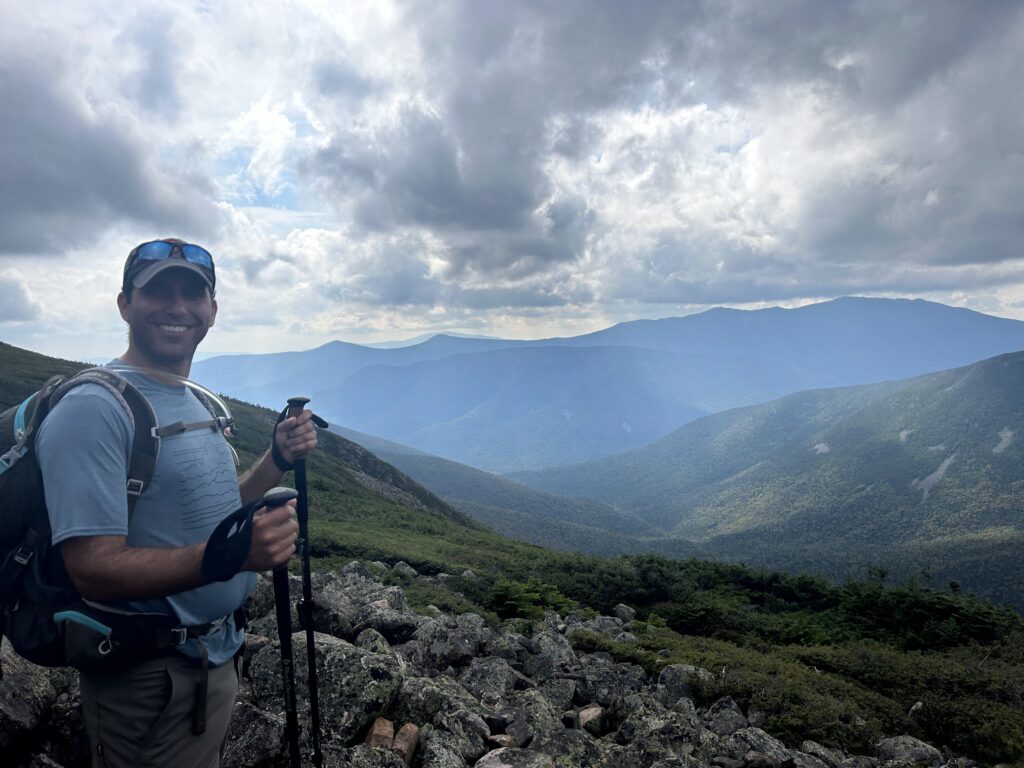
**After this profile was published, Pablo has since landed at Bright Horizons as their Director of Product Management**
Pablo Bello is an outside of the box product leader who learned to go on offense through a defensive learning experience. He’s served as a co-founder, built a product team from scratch for a successfully acquired neobank, and is plotting his next move to a growth stage startup.
Growing up in Miami, he comes from a family of small business owners who immigrated from Venezuela when he was young. Pablo’s parents built an international trading business, his mom trained as an accountant and his dad a former architect. Pablo’s dad taught him to beware of paradigms & fixed ways of thinking. “Always invert your problem solving” he would urge.
Pablo loved math, science, history, and of course engineering. His love of technology took him north to Boston and MIT. As an undergrad he competed in MIT’s 2.007 design competition. A class where the students build robots and compete in a “battle bots” type competition, the MechE’s take this class very seriously. The course acts as a general engineering challenge to test the students and, ultimately, demonstrate problem solving capabilities.
Pablo learned that in years past the most successful robots had a defensive strategy. Statistically, defensive robots yielded better outcomes than an offensive & defensive balanced one. Like a product manager, the competition was about solving problems better than your opponent. Pablo completed the task well, scoring 2nd in the entire competition. A flagship accomplishment of his MIT years, he even got to travel to Japan after his podium placement.
The summer before he graduated, Pablo interned at Tesla in the Bay Area as the company went public. This experience reinforced his love of technology and opened his eyes to the careers in and around engineering focused organizations. He learned he didn’t just want to be an engineer.
Upon graduation, he and some MIT friends partnered with a doctor from Mass General to create a “smart shirt” with meta sensors that helped track sleep. They soon pivoted to a monitoring device for babies, brought on a new CEO, and then Pablo jumped to a new more software focused project.
Alongside another MIT classmate, they started a last mile logistics alcohol delivery company called DrinkIn (before Drizzly!) that was vertically integrated in the mold of DoorDash. As they attempted to scale, many investors weren’t receptive to their capex heavy business and didn’t invest in alcohol related startups. DrinkIn eventually ran out of money, but Pablo loved what he had learned about logistics.
Local food company Walden Local was simultaneously solving a “last mile” logistics challenge scaling their local produce, meat, eggs, etc. supply chain. Pablo joined the team after a trial basis as the Lead Product Manager, their first technical hire, helping to build out their back end operations.
Then another opportunity arose. Airfox, a fintech neobank banking the unbanked in Latin America, gave him the opportunity to be their first PM in a fast growth, venture backed environment. Operating under the commercial name banQi, Airfox grew rapidly as a modern payment infrastructure platform. Operating in Brazil, there was a lot to think about from a product perspective to better understand how to build products for customers that are partly illiterate and have very different needs than a millennial American. Pablo and the team traveled to Brazilian favelas to collect customer feedback and understand the intricacies of the user experience.
They expanded from a single PM to 4 PMs, brought on a Lead Designer, and built out a full support team & processes as they scaled. They built scrum and instituted pods alongside an experienced engineering team. The CTO took Pablo under his wing and he learned a ton while also working with a product coach who had been there and done that before him. After just two years, they announced a huge partnership with Via Varejo, the Walmart of Brazil. When it seemed like they were headed toward an acquisition (which they later consummated), Pablo stepped away.
His dad had gotten sick and, with all the travel, he wanted to take a break to be closer to him. It was time well spent. When his dad passed away, Pablo took the necessary time off to get his affairs organized and more necessary time to heal.
Pablo has since been consulting with startups like coUrbanize, a healthtech project he co-founded called Lilac Health, and most recently with a Miami based fintech platform with Airbox / banQi alums called Onyx Private. The MIT network has more than a few options for talented startup veterans and accomplished battle bot champions like Pablo Bello.
Wireframing Concepts
The concept of building an MVP has changed a lot over the past few years. When Pablo is inspired by new ideas, he’ll start playing with no code application builders Bubble or Adalo to begin testing front end concepts. Then he’ll pair those apps up with a no code back end platform like Xano. All tools you can learn in a week, allegedly..
Either way, being able to deploy logic that can support API integrations, run full relationship databases & scripts, and have something that can be put in front of customers is a powerful way to test your ideas in a more functional way. When Pablo built the first version of Lilac Health, he used these very tools to have something to put in front of potential customers.
In early stage companies, more resourceful and technically minded PMs who want to validate ideas through real deployment can turn these ideas into software and get more rapid learnings from potential customers than ever before. All it takes is a general understanding of APIs, webhooks, and your own technical stack to begin seeing which products and features resonate.
3 Career Insights / Learnings
Understand the Pain – “Truly understanding the customer and end user pain points has been an important part of learning in my career. That means doing certain exercises that aren’t necessarily in the product realm, like understanding the decision making units of the product journey. I recall learning when Airbnb offered up professional photography for their initial hosts. Were users going to tell them that they wouldn’t stay at those apartments because the pictures weren’t any good? No, they had to go in there and figure out the intimate stages of the customer buying journey at each step of the process”
Scaling Documentation – “As a team and product grows in complexity and size, documentation should reflect the size and scale of the team. In the earlier days of Airfox, using Google Docs to keep notes on a few key things made sense. Then eventually we needed PRDs, roadmaps, check ins & meetings as we got past 10 people. But, the documentation should appropriately grow with the complexity of the products and team”
Strategy As Top Priority – “Product managers need to do a good job of prioritizing the actions that are going to move the needle. If the goal is to reach ‘x’ number of users to fundraise, then they can take a step back to help build the features that will actually get them to that point instead of more ‘coasting’ type actions like bug fixes, new designs, or week to week sprint planning. Being active, not passive is the key to driving progress as a product manager”
Pablo loves startups, especially the incredible journey of going from 0 to 1. At this point in his career he’s looking to further develop his skills at the growth stage, with startups as they begin to find product market fit. He’s looking to continue to grow as a product leader where he can help lead projects around branding, onboarding, dealing with churn, and more. How exactly will that opportunity manifest itself? We’ll just have to wait and see!
If you’d like to learn more about Pablo, you can find him on LinkedIn or his personal website. In the real world, he’s probably hiking around New England, exploring coffee shops near Cambridge, or rapidly building fully wrapped prototypes to test new ways that technology can help solve our problems. Thanks for sharing. We’re excited to see the products and teams you build in the coming years!
